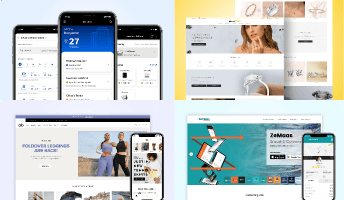How Much Does It Cost to Build an AI App for the Healthcare Industry?
.jpg)
AI is showing up in more parts of healthcare—helping with diagnostics, managing patient data, and reducing repetitive work for medical staff. It’s not futuristic anymore; it’s already in use.
That’s why more businesses are now asking what it takes to build an AI app for healthcare. And more importantly, how much it costs.
In this blog, we’ll look at the actual cost of building a healthcare AI app in 2025. We’ll cover what affects the price, the kind of features that matter, and what to expect if you’re working with an AI development company. If you're planning to invest in custom AI development, this guide is a good place to start.
Why AI Is Transforming Healthcare
AI is helping doctors work faster, make more informed decisions, and cut down on time spent handling routine tasks. In diagnostics, AI models are already being used to detect patterns in scans, lab reports, and patient records. Companies like PathAI are training their systems to assist pathologists in identifying diseases like cancer more accurately and in less time.
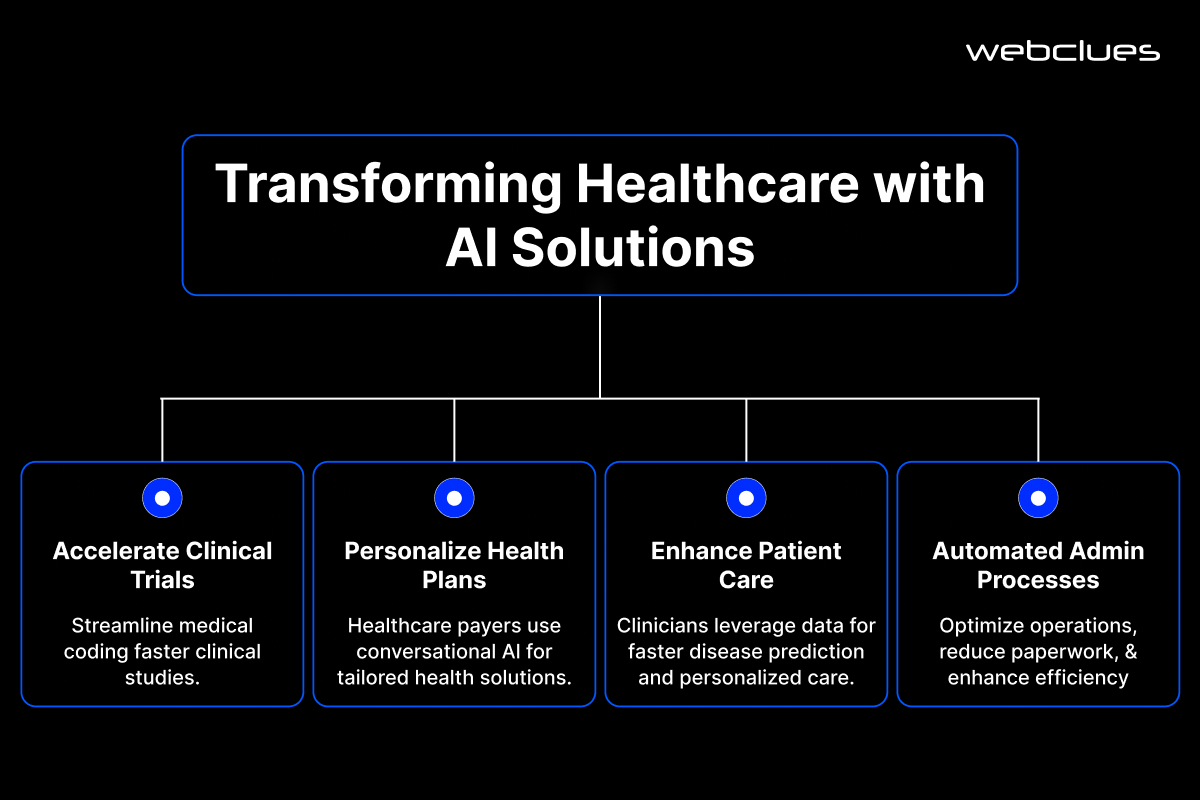
In patient triage, apps like Babylon Health and Ada are making it easier for users to get a basic understanding of their symptoms before deciding whether they need to visit a doctor. These tools don’t replace medical advice, but they’re helping filter and prioritize care, which reduces the pressure on hospitals.
AI also plays a growing role in managing chronic illnesses. Predictive models can alert doctors before a condition worsens, using data from wearables or patient records. And virtual assistants, powered by natural language processing, are answering common patient queries and helping schedule appointments.
This kind of AI application development in healthcare is becoming more common, not just because the tech is improving, but because the problems it solves are very real. A well-built healthcare AI app can save time, reduce mistakes, and help patients get the care they need faster.
Real-World Costs of Developing AI Healthcare Applications
The cost of building an AI-powered healthcare app can vary widely, depending on the type of AI being used and the complexity of the solution. Some apps are built to handle predictive analytics, while others may focus on medical imaging, patient communication, or backend automation. Here are more specific pricing examples to help you plan.
These numbers account for actual cost drivers like data annotation, model tuning, HIPAA compliance, and integration with existing healthcare systems.
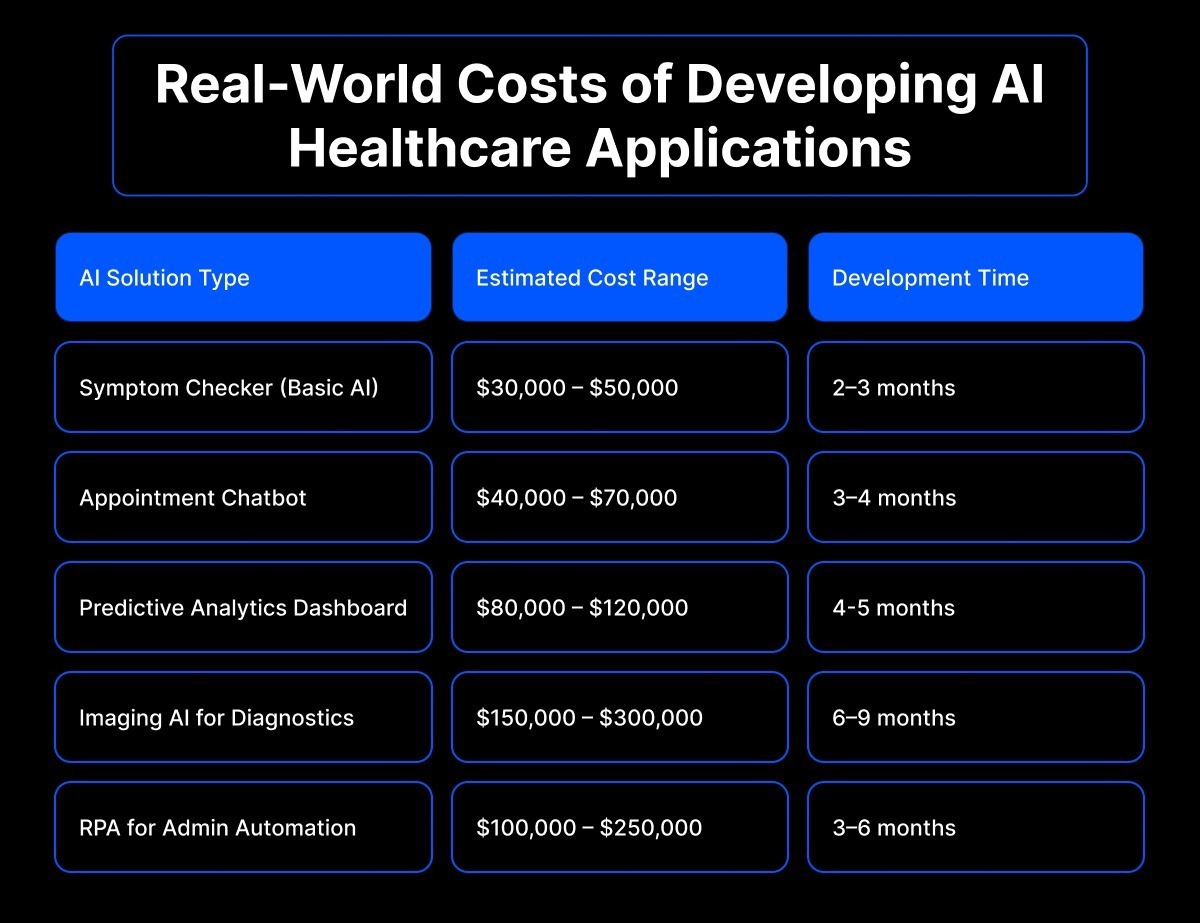
For example, a symptom checker might only require basic NLP fine-tuning and light compliance documentation. On the other hand, diagnostic imaging AI must meet rigorous HIPAA standards for data privacy, and it demands access to large medical datasets and clinical validation, making it more expensive and time-consuming to build. That’s why the pricing ranges so widely.
How AI Has Reduced Development Time and Cost
AI isn’t just the product—it’s also part of the process.
Today, developers use pre-trained models like BERT, MedPaLM, or BioGPT to fast-track AI features. Instead of spending 3–4 months building an NLP model for symptom checking, teams can now fine-tune a public model in 2–3 weeks, reducing development cost by up to 40%.
AI-based dev tools also speed things up. Platforms like GitHub Copilot and low-code AI frameworks handle backend logic, documentation, and even testing suggestions, cutting down weeks of work.
Cloud-based infrastructure helps too. Teams can build, deploy, and scale without needing to set up servers, further trimming both dev time and infrastructure costs.
The result? Faster MVPs, lower AI integration costs, and reduced need for large in-house AI teams.
Key Factors That Influence AI-Based Healthcare App Development Costs
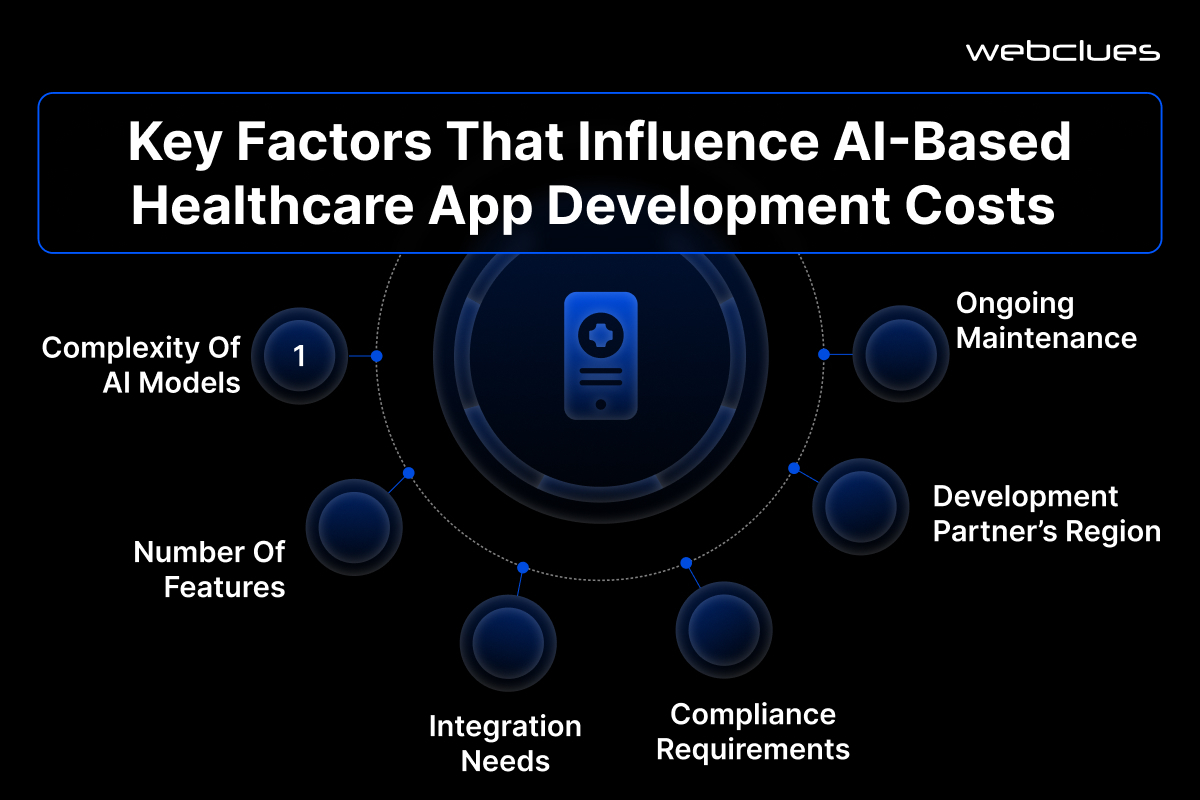
- Complexity of AI Models: A basic chatbot is very different from a large language model. More complexity means more time for data prep, training, and validation.
- Number of Features: The more your app does, the longer and costlier it is to build.
- Integration Needs: EMRs, insurance APIs, and wearable data all add effort.
- Compliance Requirements: HIPAA, GDPR, and sometimes FDA checks are non-negotiable.
- Development Partner’s Region: Offshore teams with healthcare experience can reduce costs.
- Ongoing Maintenance: Expect 15–25% of your initial budget annually for updates and monitoring.
Cost of Adding AI to an Existing Healthcare App
If you already have a working healthcare app, adding AI features doesn’t always mean starting from scratch. In many cases, modules like symptom checkers, chatbots, or analytics dashboards can be bolted on.
Typical cost to integrate AI into an existing app: $20,000–$60,000
However, for advanced upgrades like diagnostic support or real-time EMR sync, your app architecture might need changes. In such cases, a partial rebuild could be more efficient.
Cost-Saving Tips Without Compromising AI Performance
Building a healthcare AI app doesn’t have to break the bank—if you plan smart from the start. Here are a few ways to keep costs under control without cutting corners on performance.
Start with an MVP + Core AI Features
Focus on the essentials first. A healthcare AI MVP might just include a chatbot, basic patient triage, or a single AI-powered dashboard. This helps you validate the idea before investing in a full-scale solution.
Use Pre-Trained Models
You don’t always need to train an AI model from scratch. Tools like MedPaLM, BERT, and other open-source frameworks can be adapted for healthcare use cases. It cuts down on training time, data requirements, and infrastructure costs.
Go with Cloud-Based Architecture
Instead of managing your own servers, use platforms like AWS, Azure, or GCP to run your AI infrastructure. Cloud-based setups are more flexible and scale as you grow—plus, you only pay for what you use.
Outsource to the Right Development Partner
AI development outsourcing can reduce costs significantly, especially if you work with a team that already knows the healthcare space. Look for a partner that brings both AI and compliance experience to the table.
Work in Agile Sprints
Building in stages helps catch problems early and keeps budgets on track. Agile sprints also let you adjust features and priorities based on what actually works, not just what was planned at the start. It’s a practical way to manage AI app development cost saving without sacrificing quality.
Why Choose a Specialized AI Development Company
Healthcare isn’t an industry where you can afford trial and error, especially when building AI solutions that handle sensitive data, clinical workflows, or anything patient-facing.
Working with a team that understands both AI and medical compliance means fewer mistakes, smoother communication, and faster turnaround times. From HIPAA to GDPR, there are standards that need to be met at every level—from architecture to UI.
If you’re looking to hire AI developers for healthcare, experience matters. A team familiar with electronic medical records, patient privacy, and healthcare integrations can help you avoid common pitfalls—and keep the project moving forward without delays.
At WebClues Infotech, we’ve worked with healthcare teams to build reliable, secure, and user-friendly AI tools. Whether it’s a predictive analytics dashboard, a chatbot for patient triage, or a full custom healthcare AI app development project, we focus on practical outcomes and long-term performance.
For teams looking to get it right the first time, working with a company that offers end-to-end AI software development for healthcare providers is often the safer and smarter choice.
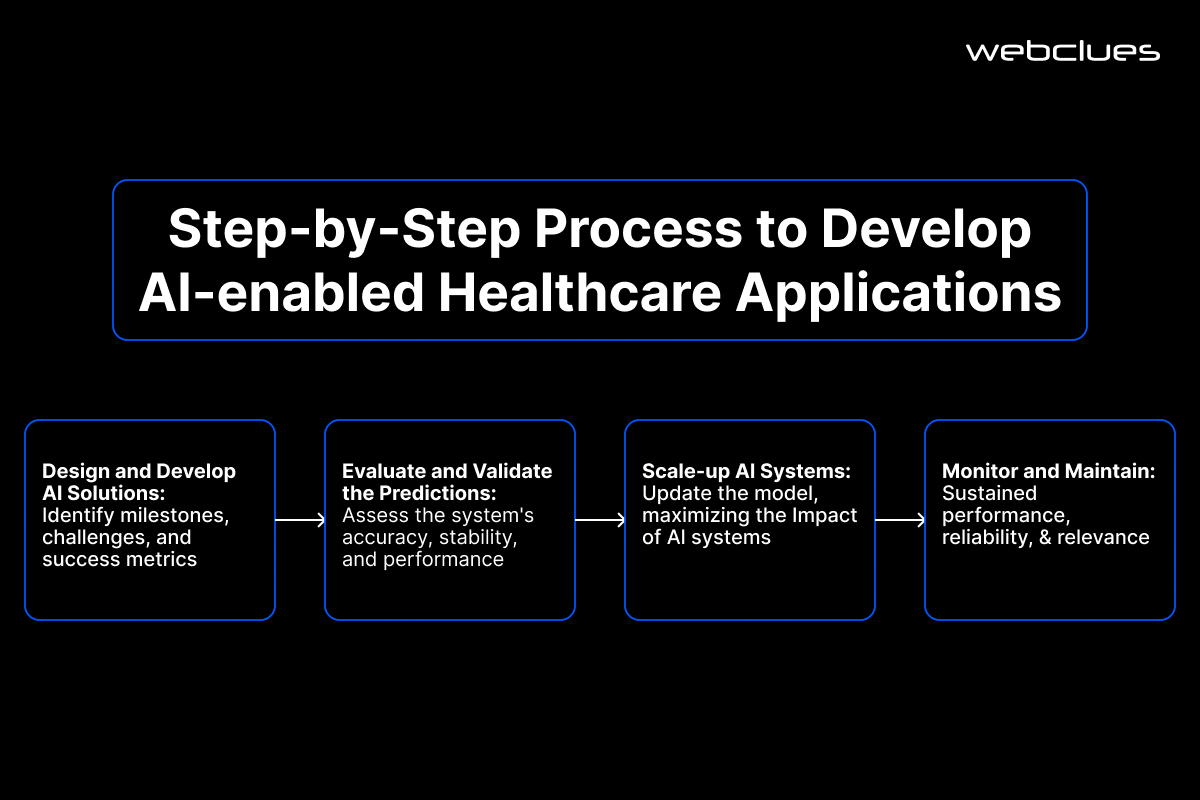
Final Thoughts – Is the Investment Worth It?
AI healthcare apps do cost a little to build. However, they can deliver long-term value that goes beyond just cutting costs.
With the right setup, AI can reduce human error, support faster decision-making, and improve the overall patient experience. It also helps ease the burden on healthcare teams by automating repetitive tasks like documentation, scheduling, and initial triage.
Over time, that leads to fewer bottlenecks, better outcomes, and lower operational stress. And we’re already seeing this in action—whether it’s AI-powered imaging tools helping radiologists catch early signs of disease, or chatbots assisting clinics in managing appointment loads more efficiently.
So yes, the upfront investment can be significant. But for teams planning to scale or improve the way they deliver care, it’s an investment that tends to pay off.
FAQs
What is the average cost of developing an AI healthcare app?
Most AI healthcare apps fall in the range of $150,000 to $500,000, depending on features, complexity, and compliance requirements. This can vary based on whether you're building from scratch or upgrading an existing platform.
How much does it cost to add AI features to an existing medical app?
If your app already has a stable backend, adding AI modules like chatbots or analytics can cost anywhere from $20,000 to $60,000.
What factors affect the cost of AI app development in healthcare?
Key factors include the type of AI used (ML, NLP, vision models), number of features, integrations with EMRs or wearables, compliance needs, and ongoing maintenance. Team location and tech stack also play a role.
Can I build a HIPAA-compliant AI app on a budget?
It’s possible to launch a lean, compliant MVP by focusing on one or two features and using pre-trained models. Costs will still be higher than a regular app, but careful planning helps control expenses.
How long does it take to develop an AI health app in 2025?
A basic version takes around 3–4 months. A full-featured, production-grade app with integrated AI typically takes 6 to 12 months, including time for testing and validation.
Need a Cost Estimate for Your Healthcare AI App?
Let our AI experts at WebClues Infotech help you plan, design, and build a secure, scalable AI solution tailored for healthcare. Contact us for a free consultation.
Build Your Agile Team
Hire Skilled Developer From Us
Build scalable, secure, and regulation-ready AI healthcare apps with WebClues
From predictive diagnostics to automated admin tools, our healthcare AI development services prioritize compliance, speed, and clarity on costs. Get a custom quote and timeline estimate based on your real-world use case.
Get a Quote!Our Recent Blogs
Sharing knowledge helps us grow, stay motivated and stay on-track with frontier technological and design concepts. Developers and business innovators, customers and employees - our events are all about you.
Contact Information
Let’s Transform Your Idea into Reality - Get in Touch
India
Ahmedabad
1007-1010, Signature-1,
S.G.Highway, Makarba,
Ahmedabad, Gujarat - 380051
Rajkot
1308 - The Spire, 150 Feet Ring Rd,
Manharpura 1, Madhapar, Rajkot, Gujarat - 360007
UAE
Dubai
Dubai Silicon Oasis, DDP,
Building A1, Dubai, UAE
USA
Delaware
8 The Green, Dover DE, 19901, USA
New Jersey
513 Baldwin Ave, Jersey City,
NJ 07306, USA
California
4701 Patrick Henry Dr. Building
26 Santa Clara, California 95054
Australia
Queensland
120 Highgate Street, Coopers Plains, Brisbane, Queensland 4108
UK
London
85 Great Portland Street, First
Floor, London, W1W 7LT
Canada
Burlington
5096 South Service Rd,
ON Burlington, L7l 4X4

